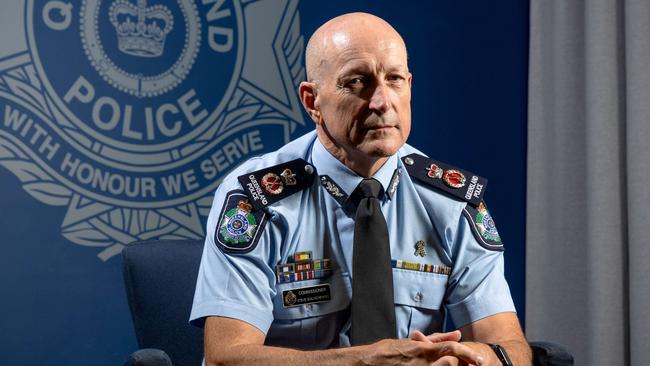Wieambilla massacre: Black spots expose need for police radio upgrade
Queensland’s top cop says the service is reviewing its radio network following damning revelations at the Wieambilla inquest.

QLD News
Don't miss out on the headlines from QLD News. Followed categories will be added to My News.
Police Commissioner Steve Gollschewski says the service is reviewing its radio network following revelations of communications black spots aired in the Wieambilla inquest examining the murder of two police officers.
Constables Matthew Arnold and Rachel McCrow were murdered by three delusional conspiracy theorists when they arrived to a Wieambilla property to conduct a missing persons inquiry on December 12, 2022. Local man Alan Dare was also murdered.
The inquest into their deaths was told there were regular major communications issues in the region for officers – on regular shifts and during the incident – with their phone reception and radio transmission quality poor.
There was also confusion from frontline police about which channel to use.
The inquest was told there were three separate channels and officers had not been given instructions as to which to use on the day of the killings.
The service has now provided officers with a master list of radio channels and has a black spot register.
When asked if the service would commit to a further review of communications black spots, Commissioner Gollschewski told The Courier-Mail the service was investigating a better system for the front line.
“We are already doing a piece of work around that,” Mr Gollschewski said.
“So, coincidentally at the same time, the Government Wireless Network (GWN) is contracted to 2027.
“So just that piece of work meant that we had to look at, well, what’s the future look like in that comms space.
“And we want to look at what do we need, what’s our strategy as an organisation going forward.
“So that any of our members – bearing in mind it’s not just police now we’ve got people on vessels and Marine Rescue Queensland and we’ve got SES in the field as well that are in a critical response or emergency response out there – how can we make sure that any of our people working in a response situation have got reliable comms?”
Mr Gollschewski said it was important officers could access data in a reliable way.
“And what we are seeing, of course, is that there’s no one solution, you know, there’ll be GWN in some areas, there may be commercial network and others, there might be things like Starlink. I’m not endorsing one thing or another.
“But we’re open to any of that to make sure that we’ve got guaranteed comms because in our job that guaranteed access – as we saw in Wieambilla – to the systems that can allow them to connect and get the information in and also get assistance is absolutely critical.
“So we’re not waiting for the outcomes of any inquiry, although of course we will take that on board, but we’re working forward about what does that need to look like for us going forward.”
Mr Gollschewski said he believed the service would have a blended model depending on what region they worked in but expected it to be more streamlined than what is available currently.
More Coverage
Originally published as Wieambilla massacre: Black spots expose need for police radio upgrade



